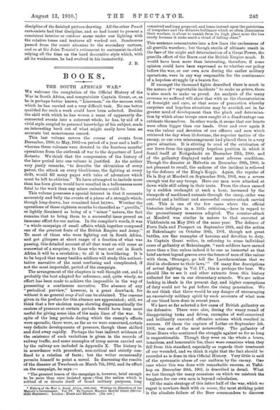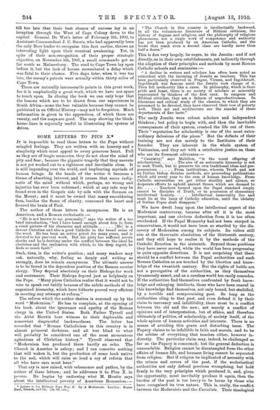BOOKS.
THE SOUTH AFRICAN WAR.* WE welcome the completion of the Official History of the War in South Africa, and congratulate Captain Grant, or, as he is perhaps better known, "Linesman," on the success with which he has carried out a very difficult task. No one better qualified for such a work could have been selected. Besides the skill with which he has woven a maze of apparently dis- connected events into a coherent whole, be has, by aid of a vivid style coupled to personal knowledge of his subject, made an interesting book out of what might easily have been an accurate but monotonous record.
This last volume covers the course of events from December, 1900, to May, 1902—a period of a year and a half— whereas three volumes were devoted to the fourteen months' operations from the outbreak of war to the departure of Lord Roberts. We think that the compression of the history of the later period into one volume is justified. As the author very justly remarks, "to describe the skirmishes of every patrol, the attack on every blockhouse, the fighting at every drift, would fill many pages with tales of adventure which must he left to oblivion." To have attempted to include more than has been given would have resulted in a tediousness more fatal to the work than any minor omissions could be.
This volume possesses a special interest in that it recounts accurately and fully the events of a phase of a struggle which, though long-drawn, has remained least Imewn. Whether the operations of these eighteen months be classified as "guerilla," or lightly dismissed as being of a " minor " nature, the fact remains that to bring them to a successful issue proved an immense effort for our nation. In the compiler's words, it was " a whole campaign of small affairs whieh together composed one of the greatest feats of the British Empire and Army." To most of those who were fighting out in South Africa, and got glimpses at short range of a fraction of what was passing, this detailed account of all that went on will come as somewhat of a surprise; to those who were not out in South Africa it will be a revelation ; to all it is bewildering. It is to be hoped that many besides soldiers will study this authori- tative narrative of the most confusing and complicated, if not the most importInt, period of the campaign.
The arrangement of the chapters is well thought out, and is probably the best adapted for reference, and, quite wisely, no effort has been made to achieve the impossible in the way of presenting a continuous narrative. The absence of any "periodical purview," however, is a great drawback, for without it no general coup d'ceil can be obtained. The reasons given in the preface for this absence are appreciated ; still, we think that a few skeleton maps showing diagrammatically the centres of pressure at certain periods would have been most useful for giving some idea of the main lines of the war. In spite of the long periods during which the enemy's efforts were sporadic, there were, as far as we were concerned, certain very definite developments of pressure, though these shifted and died away rapidly. Perhaps the best indirect evidence of the eaistence of such variations is given in the records of railway traffic, and some examples of troop moves carried out by the railway are included in Appendix X. The history is, in accordance with precedent, non-critical and strictly con- fined to a relation of facts ; but the writer occasionally permits himself to point a moral. In discussing the results of the disaster at Tweebosch on March 76,1902, and its effect on the campaign, he says :—
"The greatest lesson of the campaign is, however, brief enough to be more than once insisted upon—that the nation which is robbed of or divests itself of broad military purposes, long • History of the War in South Africa, 1899-1902. Written by Direction of his Majesty's Government Vol. IV. By Captain Maurice Harold Grant (Devon. shire Regiment). London : Hurst and Blackett. [21s. neti
conceived and long prepared, and leans instead upon the patriotism of irregulars and the delusive brilliance which so often illuminates their warfare, is about to vanish from its high place none the less surely because it sinks amid a cloud of failing stars."
This sentence concentrates into a few lines the uselessness of all guerilla warefare ; but though sterile of ultimate result in the face of the might and determination of a Great Power, the guerilla effort of the Boers cost the British Empire much. It would have been more than interesting, therefore, if some opinion could have been expressed as to whether our policy before the war, or our own acts during the earlier military operations, were in any way responsible for the continuance of a hopeless struggle by a beaten foe.
If amongst the thousand fights described there is much in the nature of "regrettable incidents" to make us grieve, there is also much to make us proud. An analysis of the many reverses we suffered will show that with us the characteristics of foresight and care, or that sense of precaution whereby surprises and hopeless situations may be avoided, are in far greater need of development than the pluck and determina- tion by which alone troops once caught at a disadvantage can extricate themselves. In other words, it seems that our hearts were often bigger than our heads. Over and over again it was the valour and devotion of our officers and men which retrieved the day when ill-fortune, the superior tactics of the enemy, or our own mismanagement had placed them in a very grave situation. It is stirring to read of the extrication of our force from the apparently hopeless position in which it found itself at Noitgedacht on December 13th, 1900, and of the gallantry displayed under most adverse conditions. Though the disaster at Helvetia on December 29th, 1900, is not pleasant to recall, the sadness of the incident is relieved by the defence of the King's Kopje. Again, the repulse of De la Rey at Moedwil on September 30th, 1901, was a severe enough test for any troops. Here our men were attacked at dawn while still asleep in their tents. From the chaos caused by a sudden onslaught at such a hour, increased by the stampede of maddened animals through the camp, order was evolved and a brilliant and successful counter-attack carried out. This is one of the few cases where the official historian indulges in a. little criticism,—here in regard to the precautionary measures adopted. The counter-attack at Moedwil was similar in nature to that executed at Vlakfontein on May 29th of the same year. The defence of Forts Itala and Prospect on September 26th, and the action at Bakenlaagte on October 30th, 1901, though not great battles, are fine examples of heroism and devotion to duty. As Captain Grant writes, in referring to some individual cases of gallantry at Bakenlaagte, "such soldiers have earned more than a line, unless indeed it be one as immortal as that brief ancient legend graven over the bones of men of like valour with them, Stranger, go tell the Laceda3monians that we died in obedience to their laws." Of many fine descriptions of actual fighting in Vol. IV., this is perhaps the beat. We should like to see it and other extracts from this history collected for use in our elementary schools. We are rather lacking in ideals in the present day, and higher conceptions of duty could not be put before the rising generation. We do not think that there would be any danger of encouraging an excessively military spirit by such accounts of what men of our blood have done in recent years.
We have so far selected a few cases of British gallantry on the defensive. There were also, during the weary round of disappointing treks and drives, examples of well-conceived and brilliantly executed offensive actions which resulted in success. Of these the capture of Lotter on September 5th, 1901, was one of the most noteworthy. The gallantry of those Boers who continued the struggle against us for so long is unquestionable. Though they were on the whole a brave, tenacious, and honourable foe, there were occasions when they fell from this standard, especially as regards their treatment of our wounded, and we think it right that the fact should be recorded as is done in this Official History. Very little is said of the systematic abuse of our uniform by the enemy. One case where this was done with remarkable success, at Tafel- kop on December 20th, 1901, is described in detail. What we lost through the many occasions on which we mistook the burghers for our own men is beyond calculation.
Of the main strategy of this latter half of the war, which we regret is nowhere dealt with en masse, the most striking point is the absolute failure of the Boer commanders to discover
till too- late that their best chance of success lay in an irruption through the West of Cape Colony down to the capital. General De Wet's letter of February 8th, 1902, to Assistant-Commandant J. C. Smuts, who had apparently been the only Boer leader to recognise this fact earlier, throws an interesting light upon their eventual awakening. Yet, in spite of their non-recognition of their proper strategic objective, on November 5th, 1901, a small commando got as far south as Malmesbury. The rbad to Cape Town lay open before it, but the lack of horses necessitated a delay which was fatal to their.chance. Five days later, when it was too late, the enemy's patrols were actually within thirty miles of Cape Town.
There are naturally innumerable points in this great work, for it is emphatically a great work, which we have not space to touch upon. In closing the book we can only hope that the lessons which are to be drawn from our experiences in South Africa—none the less valuable because they cannot be published in an Official History—may not be forgotten. Much information is given in the appendices, of which there are twenty, and the maps are good. The map showing the block- house lines is especially useful in illustrating the system of drives.







































 Previous page
Previous page